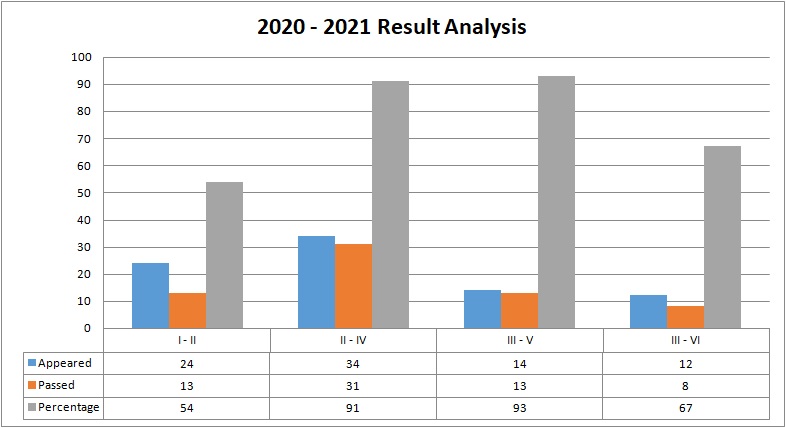
The department of Economics has established in 1972. Presently one sanctioned posts in the department. The faculty of the department enrich the students knowledge, and improve the knowledge about not only in Economics but also in practical skills to the needs of the society. The department extends its services to prepare the students in competitive examinations and higher education purpose to make the perfection in real life.
VISION: Imparting quality of Education and inculcating of the spirit of research through innovative teaching practices.
MISSION : To develop the communication skills and better thoughts for problem solving in the society as a whole.
S.No |
Name |
Designation |
Qualification |
Photo |
Curricullum Vitae |
| 01 | Dr. K Bhaskar Rao | Assistant Professor | MA, Ph.D |  |
View CV |
S.No |
Year of Starting |
Title of the Program |
LEVEL (UG, PG) |
Duration (Years) |
Sanctioned Annual Intake |
1 |
1972 |
B.A (History, Economics, Political Science) |
UG |
3 |
60 |
2 |
2020 |
B.A (History, Economics, Functional Telugu) |
UG |
3 |
30 |
Course Objectives and Outcomes of B. A. Economics Programme
COURSE LEARNING OUTCOME PERSPECTIVES AND METHODOLOGY OF ECONOMICS
1. Students will familiarise different branches of Social Sciences
2. Knowhow on Methodology of Social sciences
3. Know how to conduct Social and Economic Researches.
4. Understand various quantitative and qualitative economic models.
5. Learn to apply methods and theories of Social Sciences to contemporary Issues.
SEMESTER-I
PAPER-1, MICRO ECONOMICS-CONSUMER BEHAVIOUR
Course Objectives
1. The student becomes able to analyze individual rationality in situations of scarcity and choice.
2. The student becomes capable of finding settlement of optimization problems.
Course Outcomes
1. It gives the foundation for economic analysis and problem solving.
2. Know to analyse consumer behaviour and consumer decisions.
3. Know how to solve basic micro economic problems.
SEMESTER-II
PAPER-II, MICRO ECONOMICS-PRODUCTION AND PRICE THEORY
1. An understanding of the theory of production and costs and theory of firm and institutions.
2. Equip the students about various aspects of the micro economic theory and the latest developments in the field.
3. Develops skill in formulating business strategy in the context of market imperfections
4. Develops skill in using game theory models in decision making
5. Learns to use the concept of price elasticity in calculating marginal revenue
6. Acquires knowledge of reaction curve approach and its application in other branches of economics
SEMESTER-III
PAPER-III, MACRO ECONOMICS-NATIONAL INCOME, EMPLOYMENTAND MONEY
Course Objectives
1. Students understand about the functioning of the M\macro economy under different assumptions.
2. Students are able to compute national income from a hypothetical situation
Course Outcomes
1. Understand macroeconomic principles, concepts, and theories.
2. Understand the basic concepts regarding money and functioning of a pecuniary economy
3. Capable to understand theoretical approaches to the determinants and measures of money supply and its role in causing the business cycles
4. Get insight in to the different schools of thought regarding the demand for money.
5. Able to integrate theoretical knowledge to evaluate policy measures.
SEMESTER-IV
PAPER-IV, MACRO ECONOMICS- BANKING AND INTERNATIONAL TRADE
1. Get awareness of the monetary policy formulations, its targets and objectives and to create an interest in the recent monetary reforms initiated in India
2. Thorough understanding on International Economic System.
3. Deep knowledge on international flow of goods and services and nation’s BOP.
4. Know the significance of international economic relations.
SEMESTER-V
PAPER-V, ECONOMIC DEVELOPMENT AD INDIAN ECONOMY
Course Objectives
1. To enable the students to understand the theories and strategies of growth and development
2. To impart knowledge about the issues relating to sustainable development, environmental protection and pollution control measures.
Course Outcomes
1. Student acquaint with the basic concepts and issues of growth and development
2. Provide an insight into the modern approaches to economic development.
3. Know how to measure National Income.
4. An insight into the need for sustainable economic development.
5. Study about Human Development Indicators and their role in designing development programmes.
6. A thorough understanding on Indian Economic System.
PAPER-VI, INDIAN AND ANDHRA PRADESH ECONOMY
Course Objectives
1. The students become aware of the historical and theoretical perspectives of the development of Indian Economy.
2. The students become aware of various challenges of the Indian Economy.
1. To provide the students with a critical understanding of the Indian economy so that they may be able to engage meaningfully in debates regarding the country’s economy
2. To help students contribute to the formulation of its policies. in order to achieve this,
3. To introduces the students to broad contours like the status, issues and policies of the Indian economy at the aggregated (macro) as well as sectoral levels.
4. The students become aware ofthe historical and theoretical perspectives ofthe development of Indian Economy.
5. The students become aware of various challenges of the Indian Economy.
SEMESTER-VI
PAPER-VII(A), AGRICULTURAL ECONOMICS
1. Sensitize the overall development and engine of growth in agriculture. Draw distinctive features of rural and urban economy or agricultural and non-agricultural which can influence the whole economy.
2. Learn and identify the opportunities open/available in those flourishing sectors such as horticulture, fishing and floriculture and forestry. Find new investment opportunities to add income and employment.
3. Understand limited resources available in the economy. Realize the need to exploit and utilize through development and improvement of production techniques.
4. Make them aware of the availability of rich natural endowments to achieve sustainable agricultural development. With this knowledge they can challenge the problems of unemployment, inequality, shortage of food productions, poverty, and be useful to
compete advanced agricultural economies.
5. Gain knowledge of the causes of regional variations in productivity and production, social and economic inequality, size of land holdings and lack of quality inputs etc. and suggest appropriate measures for the whole economy
PSO1: Students will familiarise different branches of Social Sciences.
PSO2: Know the Methodology of Social sciences.
PSO3: Know how to conduct Social and Economic Researches.
PSO4: Understand various quantitative and qualitative economic models.
PSO5: Learn to apply methods and theories of Social Sciences to contemporary Issues.
| Seminars |  |
Quizzes |  |
|
| Assignments |  |
Remedial Classes |  |
|
| Group Discussions |  |
| Assignments |  |
Remedial Coaching |  |
|
| Quizzes |  |
Student Seminars |  |
|
| Group Discussions |  |
| S.No | Date | Conducted By | Name of The Activity | Details of Resource Person | No of Participants | Report |
|---|---|---|---|---|---|---|
| 01 | 04-01-2022 | Economics | Guest Lecture | M. Yedukondala Rao, Lecturer in Economics, GDC, Chebrole |
31 | Click Here |
| 02 | 16-03-2022 to 22-03-2022 |
Economics | Student Exchange Programme | SVRM College, Nagaram |
18 | Click Here |
| Remedial Classes |  |
Student Seminars |  |
|
| Assignments |  |
Quizzes |  |
|
| Group Discussions |  |
|||
| Remedial Classes |  |
Student Seminars |  |
|
| Assignments |  |
Quizzes |  |
|
| Group Discussions |  |
|||
| Remedial Classes |  |
Student Seminars |  |
|
| Assignments |  |
Quizzes |  |
|
| Group Discussions |  |
|||
| Remedial Classes |  |
Student Seminars |  |
|
| Assignments |  |
Quizzes |  |
|
| Group Discussions |  |
|||
STUDENT SEMINARS


Quiz


DISCUSSIONS

GUEST LECTURES

COMMUNITY SERVICE PROGRAMMES
AWARNESS PROGRAMME ON AIDS:

CLEAN & GREEN PROGRAMME

TREE PLANTATION

| S.NO | Title of paper | Name of the author/s | Department | Name of journal | Year of Publication | ISBN / ISSN number | DOI Link |
| 1 | Socio-economic impact of COVID-19 pandamic in Asian and Pacific | Dr. K. Bhaskar Rao | Economics | Revival of Agriculture And Rural Development | 2022 | ISBN-978-93-92257-26-2 | |
| 2 | Impact of COVID-19 pandamic on migration labour and economic growth | Dr. K. Bhaskar Rao | Economics | Growth rate Stratagies to Review Indian Agriculture and Economy: Post COVID-19 | 2022 | ISBN-978-93-5607-863-5 |

YEAR |
SEM-V(PAPER-V) |
SEM-V(PAPER-VI) |
SEM-VI |
TOTAL |
||||
APPEARED |
PASSED |
APPEARED |
PASSED |
APPEARED |
PASSED |
APPEARED |
PASSED |
|
2015-16 |
27 |
23 |
27 |
23 |
-- |
-- |
27 |
23 |
2016-17 |
34 |
34 |
34 |
32 |
-- |
-- |
34 |
32 |
2017-18 |
25 |
24 |
25 |
21 |
24 |
24 |
24 |
21 |
2018-19 |
22 |
12 |
22 |
15 |
15 |
15 |
15 |
12 |